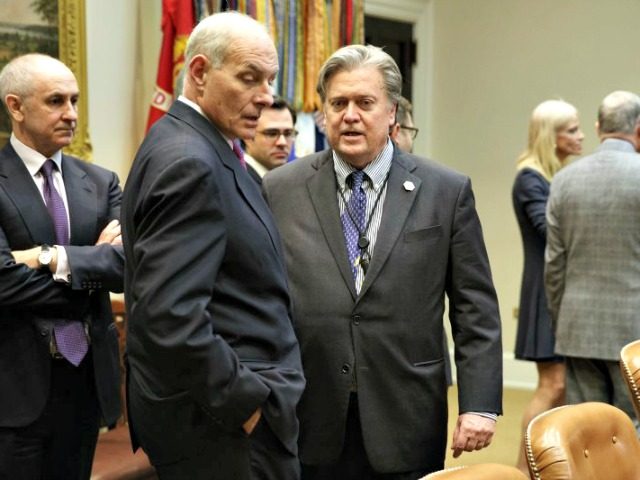There’s still a story buried somewhere in the Washington Post’s February 4 article “Inside the White House-Cabinet Battle Over Trump’s Immigration Order,” but you have to wade through a deep moat of corrections and retractions to reach it.
The Post tried a poorly-sourced hit on White House strategist (and former Breitbart News executive) Steve Bannon, describing a hostile meeting between him and Homeland Security Secretary John Kelly that didn’t actually happen.
As the Washington Post’s editors eventually admitted, reporter Josh Rogin went with the same sort of anonymous sourcing that has produced so many Fake News debacles since the election, without contacting the White House to verify the account.
According to the original story, Secretary Kelly wanted to “issue a waiver for lawful permanent residents, a.k.a. green-card holders, from the seven majority-Muslim countries whose citizens had been banned from entering the United States,” but Bannon “wanted to stop Kelly in his tracks and told him not to issue the order.”
A battle royale supposedly ensued:
The disagreement between Bannon and Kelly pitted a political operator against a military disciplinarian. Two administration officials gave the following account of their exchange: Respectfully but firmly, the retired general told Bannon that despite his high position in the White House and close relationship with President Trump, the former Breitbart chief was not in Kelly’s chain of command. If the president wanted Kelly to back off from issuing the waiver, Kelly would have to hear it from the president directly, he told Bannon.
It was only a matter of hours before an editorial correction was appended to that paragraph, and acknowledged at the top of the article:
White House press secretary Sean Spicer said Kelly and Bannon spoke on Jan. 27 and 29, but denied they had a confrontation over the green card waiver. In an email sent late Saturday, Bannon also denied a confrontation with Kelly and said he had not told him to withhold the waiver.
Spicer didn’t merely deny the confrontation; he told the Huffington Post it was a “patently false, made-up story,” and said the Washington Post’s failure to seek White House comment before publishing the article was “unbelievably unprofessional.”
“Prior to publication of this column, The Post sought comment from the Department of Homeland Security but not from the White House. We should have done both. The article has been updated,” editor Fred Hiatt conceded, in a notice that now appears at the top of the piece.
“I think we got things wrong in this column. That’s why we published an editor’s note and a correction. I regret getting things wrong. We try really hard not to, but we do make mistakes. And when we make mistakes, we try to correct them and be transparent to the readers what we got wrong,” Hiatt told the Huffington Post.
On February 7th, Mediaite quoted Secretary Kelly dismissing the Washington Post piece as a “fantasy story,” and throwing in some harsh words for reporter Josh Rogin.
“Every paragraph, every sentence, every word, every space, every comma, every period is wrong. It was a fantasy story,” Kelly told Rep. Kathleen Rice (D-NY), when she asked if he was worried about pressure from White House political operatives.
“This reporter, whoever he is, got it so wrong; that’s assuming he’s not making it up,” Kelly added.
The Secretary of Homeland Security proceeded to emphasize that “I work for one man. His name is Donald Trump. He has told me one thing: Secure the border.”
The Washington Post article was a lengthy discourse on debates that really are occurring within the Trump administration, over a policy that has generated much debate among the public. It would have worked just fine without the disputed anecdote, but then it would have lacked the “White House political operators bullying Cabinet officials” angle.
(Especially this particular White House political operative, Bannon, having assumed totemic stature among adversarial media, and adversarial media having returned from an eight-year hiatus on the morning of November 9th, 2016.)
The Post’s failure to consult the people actually involved in the alleged showdown between Bannon and Kelly is cast in an especially poor light by the speed of the administration’s response to their post. How can reporters and editors justify not even trying to solicit a comment from the White House on an explosive story from anonymous sources? Contrary to Hiatt’s statement to the Huffington Post, his team didn’t “try really hard” not to get this one wrong.
Also, as the Huffington Post observed, that little story about the row between Bannon and Kelly zoomed around cyberspace many times before the corrections were made. In the Internet era, it’s more critical than ever to get the story right the first time. Fake News gets thousands of Retweets, while the corrections get hundreds at best.
Isn’t that precisely the point mainstream media apologists made, when they launched their crusade against Fake News from alternative outlets? Didn’t they boast of their superior reporting and editorial standards as vital tools for successfully pursuing the truth in a time of high-speed disinformation? Perhaps the road to recovery could begin with more healthy skepticism toward stories pushed by anonymous sources who might be nursing grudges against the new administration.

COMMENTS
Please let us know if you're having issues with commenting.